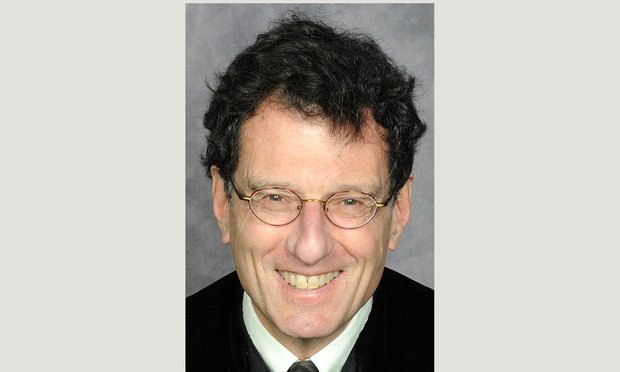Daily Dicta: What Are They Thinking? Opioid Defense Lawyers Want Judge to Recuse
If defense counsel sincerely felt they couldn't get a fair shake based on remarks Polster made in January of 2018, why didn't they speak up sooner?
September 16, 2019 at 12:59 PM
5 minute read
 U.S. District Judge Dan Polster
U.S. District Judge Dan Polster
On Saturday, a bunch of very accomplished lawyers filed a very odd motion in the opioid MDL: They asked U.S. District Judge Dan Polster in the Northern District of Ohio to recuse himself from overseeing the litigation.
The request by lawyers from Reed Smith; Williams & Connolly; Covington & Burling; Zuckerman Spaeder; Morgan, Lewis & Bockius; Locke Lord; Bartlit Beck and Jones Day representing drug wholesalers and retailers (but not the actual manufacturers) comes 20 months after the first hearing in the MDL, and after more than 2,600 documents have been filed in the case. The first bellwether trial is set to start on Oct. 21 in Cleveland.
Defense counsel make much of comments that Polster made at the initial January 9, 2018 hearing such as, "My objective is to do something meaningful to abate this crisis … dramatically reduc[ing] the number of opioids that are being disseminated, manufactured and distributed … and [assuring] that we get some amount of money to the government agencies for treatment."
The judge also said "We're losing more than 50,000 of our citizens every year," and that "150 Americans are going to die today, just today, while we're meeting."
 "We don't need—we don't need a lot of briefs and we don't need trials," Polster said. "They're not going to—none of them are—none of those are going to solve what we've got." And he said, "[I]n my humble opinion, everyone shares some of the responsibility, and no one has done enough to abate it."
"We don't need—we don't need a lot of briefs and we don't need trials," Polster said. "They're not going to—none of them are—none of those are going to solve what we've got." And he said, "[I]n my humble opinion, everyone shares some of the responsibility, and no one has done enough to abate it."
Given the context, Polster's remarks don't strike me as outrageous. But defense counsel assert that "Under settled law, any one of these statements would be enough to cause a reasonable person to question a judge's impartiality. … Those comments cannot be explained or excused as a dramatic flourish at the opening hearing, in a jammed courtroom, with an overflow audience of parties and press."
Mmmkay maybe, but if so, why didn't defense lawyers raise those concerns at the time? If they sincerely felt they couldn't possibly get a fair shake, they should have spoken up before Polster put in so much work on the case. Judicial resources are scarce. Wasting a judge's time is not cool.
The defense lawyers also complain about Polster's "singular focus on, and substantial involvement in, settlement discussions."
Please.
Because so many MDLs otherwise go to trial?
Because other judges don't sometimes strongly encourage parties to settle? (Consider for example the comments last month by U.S. District Judge Charles Breyer in San Francisco, who took it upon himself to stay all discovery in a fight between VW and the SEC and ordered to the parties "to sit down and see if you can work it out.")
Moreover, Polster did in fact authorize a litigation track ("reluctantly" according to defense counsel).
But they complain about "an unprecedentedly short schedule—nine months from the commencement of discovery until trial, in two cases, with four plaintiffs and more than 20 defendants, involving a number of opioid medications and alleged wrongful conduct over a 25-year period—with the transparent purpose of pressuring the parties to settle."
"Transparent purpose"? Or maybe the judge set tight deadlines because he didn't want to drag the cases out for years. Because 150 people are dying each day and there are about 2,000 cases in the MDL.
Besides, the lawyers who signed this motion on behalf of clients including CVS, Rite-Aid, Cardinal Health and AmerisourceBergen, come from firms that employ a combined 8,200-odd lawyers. I think they (along with the army of co-counsel for the actual drug makers) can scrounge up the resources to try a case in nine months.
Or here's a crazy thought. Could it be the defendants want Polster gone because—as my colleague Amanda Bronstad noted in coverage last week—the judge "continues to side with plaintiffs in summary judgment orders out this month"? Last week, he found that public nuisance claims and racketeering allegations should go before a jury.
I can't imagine the instant motion will succeed, that Polster will say, "Gee, now that you mention it, I will just DQ myself." But it does send a signal to the judge to watch it—and leaves open a potential avenue of appeal.
This content has been archived. It is available through our partners, LexisNexis® and Bloomberg Law.
To view this content, please continue to their sites.
Not a Lexis Subscriber?
Subscribe Now
Not a Bloomberg Law Subscriber?
Subscribe Now
NOT FOR REPRINT
© 2025 ALM Global, LLC, All Rights Reserved. Request academic re-use from www.copyright.com. All other uses, submit a request to [email protected]. For more information visit Asset & Logo Licensing.
You Might Like
View All
Firms Come Out of the Gate With High-Profile Litigation Hires in 2025

2024 Marked Growth On Top of Growth for Law Firm Litigation Practices. Is a Cooldown in the Offing for 2025?

Big Company Insiders See Technology-Related Disputes Teed Up for 2025

Litigation Leaders: Jason Leckerman of Ballard Spahr on Growing the Department by a Third Via Merger with Lane Powell
Trending Stories
- 1ACC CLO Survey Waves Warning Flags for Boards
- 2States Accuse Trump of Thwarting Court's Funding Restoration Order
- 3Microsoft Becomes Latest Tech Company to Face Claims of Stealing Marketing Commissions From Influencers
- 4Coral Gables Attorney Busted for Stalking Lawyer
- 5Trump's DOJ Delays Releasing Jan. 6 FBI Agents List Under Consent Order
Who Got The Work
J. Brugh Lower of Gibbons has entered an appearance for industrial equipment supplier Devco Corporation in a pending trademark infringement lawsuit. The suit, accusing the defendant of selling knock-off Graco products, was filed Dec. 18 in New Jersey District Court by Rivkin Radler on behalf of Graco Inc. and Graco Minnesota. The case, assigned to U.S. District Judge Zahid N. Quraishi, is 3:24-cv-11294, Graco Inc. et al v. Devco Corporation.
Who Got The Work
Rebecca Maller-Stein and Kent A. Yalowitz of Arnold & Porter Kaye Scholer have entered their appearances for Hanaco Venture Capital and its executives, Lior Prosor and David Frankel, in a pending securities lawsuit. The action, filed on Dec. 24 in New York Southern District Court by Zell, Aron & Co. on behalf of Goldeneye Advisors, accuses the defendants of negligently and fraudulently managing the plaintiff's $1 million investment. The case, assigned to U.S. District Judge Vernon S. Broderick, is 1:24-cv-09918, Goldeneye Advisors, LLC v. Hanaco Venture Capital, Ltd. et al.
Who Got The Work
Attorneys from A&O Shearman has stepped in as defense counsel for Toronto-Dominion Bank and other defendants in a pending securities class action. The suit, filed Dec. 11 in New York Southern District Court by Bleichmar Fonti & Auld, accuses the defendants of concealing the bank's 'pervasive' deficiencies in regards to its compliance with the Bank Secrecy Act and the quality of its anti-money laundering controls. The case, assigned to U.S. District Judge Arun Subramanian, is 1:24-cv-09445, Gonzalez v. The Toronto-Dominion Bank et al.
Who Got The Work
Crown Castle International, a Pennsylvania company providing shared communications infrastructure, has turned to Luke D. Wolf of Gordon Rees Scully Mansukhani to fend off a pending breach-of-contract lawsuit. The court action, filed Nov. 25 in Michigan Eastern District Court by Hooper Hathaway PC on behalf of The Town Residences LLC, accuses Crown Castle of failing to transfer approximately $30,000 in utility payments from T-Mobile in breach of a roof-top lease and assignment agreement. The case, assigned to U.S. District Judge Susan K. Declercq, is 2:24-cv-13131, The Town Residences LLC v. T-Mobile US, Inc. et al.
Who Got The Work
Wilfred P. Coronato and Daniel M. Schwartz of McCarter & English have stepped in as defense counsel to Electrolux Home Products Inc. in a pending product liability lawsuit. The court action, filed Nov. 26 in New York Eastern District Court by Poulos Lopiccolo PC and Nagel Rice LLP on behalf of David Stern, alleges that the defendant's refrigerators’ drawers and shelving repeatedly break and fall apart within months after purchase. The case, assigned to U.S. District Judge Joan M. Azrack, is 2:24-cv-08204, Stern v. Electrolux Home Products, Inc.
Featured Firms
Law Offices of Gary Martin Hays & Associates, P.C.
(470) 294-1674
Law Offices of Mark E. Salomone
(857) 444-6468
Smith & Hassler
(713) 739-1250






